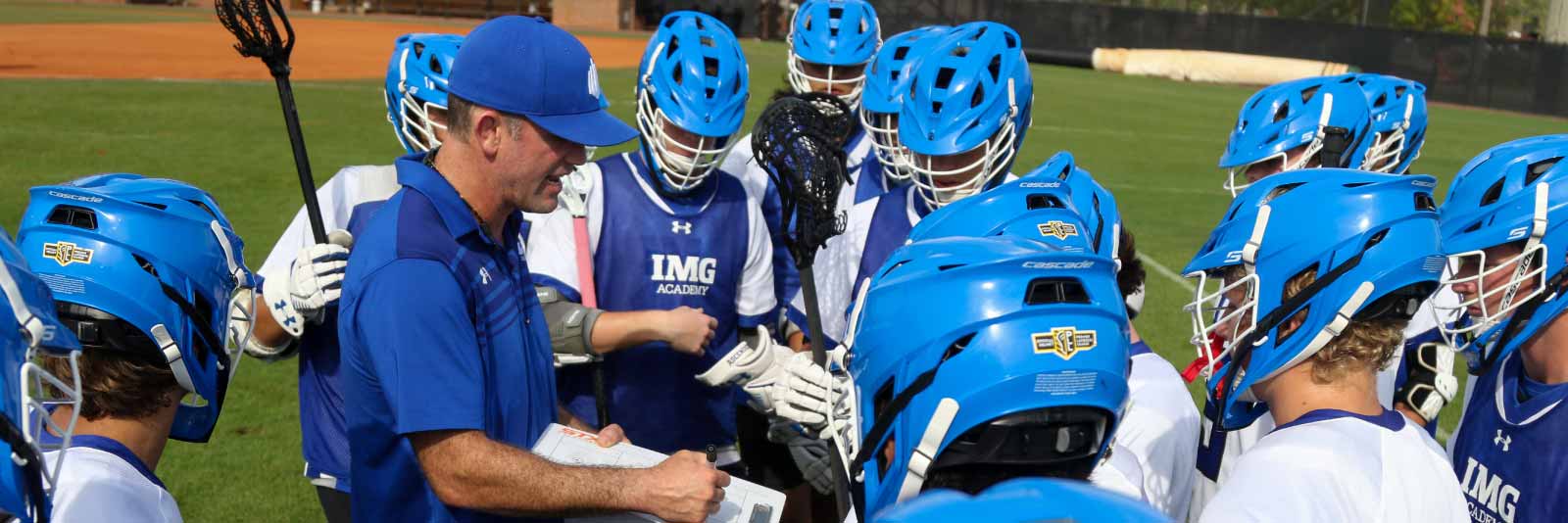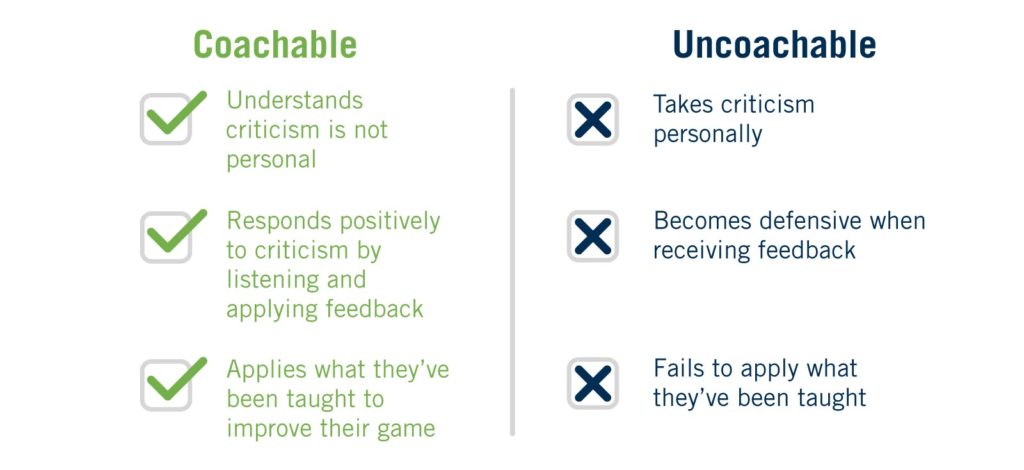How to Be Coachable

Are you coachable? The great thing about coachability is that student-athletes have complete control over whether or not they are coachable. Coachability is all about the athlete’s mindset. Athletes who remain positive, passionate and motivated will have a much easier time accepting feedback from coaches and engaging with their teammates.
Quick Links
What is coachability?
Coachability refers to an athlete’s attitude. A coachable athlete is one who openly and humbly listens to honest feedback and willingly applies that feedback to improve their athletic development.
What does it mean to be coachable?
Being coachable means you are open to being taught and trained in order to improve. You understand you are not perfect, there is always room to grow, and you show appreciation for a coach’s time and feedback by actively listening and learning from them.
Michael Jordan once said, “My best skill was that I was coachable. I was a sponge and aggressive to learn.” Athletes who fail to be coachable often plateau at a certain point due to negative approach to criticism and their unwillingness to listen and learn.
Below are a few traits of coachable athletes to practice and make habit:
- Check ego at the door
- Look coach in the eye when talking
- Be open minded and humble when receiving feedback
- Willingly implement coach feedback
- Actively seek feedback from coaches
- Be a source of positivity and encouragement for teammates
- Demonstrate commitment to the team and the game
College coaches value a recruit’s character over athletic ability
In our 2019 NCSA State of Recruiting Report, which examined the college athletic recruiting landscape and identified key trends, we asked college coaches to rank the following qualities in an athlete—character, athletic ability, academics, location. The results? Thirty-five percent of college coaches ranked character first, suggesting that college coaches care more about an athlete’s character than their skills and athleticism.
One surveyed college coach shared, “I think watching athletes play and how they interact with their coaches, teammates and parents is the most valuable. It was [important] 10 years ago, and it still is today. Those interactions show a lot about the athlete’s character.”
Our survey results and statements from coaches, like the one above, reaffirms that a student-athlete’s coachability is as much a key part of the college recruiting process as athletic ability and academics.
But our survey isn’t the first to come to this conclusion. A 2018 survey by Verified Athletics yielded similar results, finding that college coaches rated leadership as one of the highest rated attributes and said they prefer to take players that are captains of their high school team.
The difference between coachable and uncoachable athletes
The difference between a good athlete and a great athlete often comes down to the athlete’s willingness to learn and improve. Of course, the best way to improve is to actively listen to constructive criticism from coaches and apply that feedback in practice and competitions.
It’s easy to spot an uncoachable athlete. They tend to pout, eye roll or complain when they disagree with direction or criticism from coaches. These character traits not only make these athletes hard to coach, but they also hinder the athlete’s ability to develop as a competitor.
On the other hand, coachable athletes have a different mindset. Coachable athletes are open-minded and willing to make changes that will improve their game. They understand that constructive criticism is meant to help them improve and not to be taken personally. Most importantly, they are motivated and want to be pushed by their coach. These athletes are able to check their ego at the door and show their coach respect, even when they may disagree with their feedback.

How to demonstrate coachability to college coaches
It’s not enough for a recruit to tell college coaches that they are coachable, they need to demonstrate it. When coaches are out scouting talent, they aren’t just watching how the athlete performs. Coaches also like to observe the sidelines and see how athletes interact with their teammates, opponents, coaching staff and even parents.
As an athlete, here are a few things you should be conscious of during competitions.
- What is your attitude out on the field?
- Are you supporting your teammates?
- What kind of demeanor do you exhibit when your coach pulls you out of a game?
- Are you still paying attention to the game when you’re on the sidelines?
- Do you look like you’re having fun and displaying proper fundamentals, or are you pouting and complaining to officials?
Coaches are looking for the student-athletes who listen and are engaged, exhibit a passion for their sport, and have a positive influence on their team.
Because college coaches need more supporting evidence than a personal statement on a recruiting profile that says the athlete is coachable, here are a few opportunities where athletes can demonstrate their coachability:
- Camps, clinics and showcases provide student-athletes an opportunity to show coaches that they’re receptive to learning by listening to feedback and implementing what they learn during the event.
- High school and club competitions are common events that college coaches attend to evaluate how recruits interact with their teammates, coaches, competition and parents.
- Official visits give the coaching staff and current team a chance to evaluate an prospective athlete’s character and see how they will mesh with the team.
- References and letters of recommendation allow student-athletes to call on current and past coaches to make a statement vouching for the athlete’s character, athletic and academic abilities.
- Social Media content shared by athlete’s can make or break their recruiting process. A good rule of thumb is to only post content that is centered around positivity and appreciation.
Can parents help their student-athletes be more coachable?
Yes, one of the best ways to encourage coachability in student-athletes is to support their coach. When parents reinforce the importance of listening to the coach’s feedback, they are both supporting the coach and encouraging their athlete to be receptive to feedback. When parents criticize or dismiss coach feedback, their athlete will likely follow their lead and do the same the next time they’re talking with their coach during practice or competition. NCSA recruiting coach and former head college baseball coach Andy Drake knows this all too well from past experience.
“Some parents automatically get defensive (if a coach offers criticism),” Drake says. “Ultimately, a parent has to be willing to trust the coach and realize that the coach has their athlete’s best interests in mind. I’m currently coaching a team of 10-year-olds. I heard one dad ask his son what the coach had to say, and then said, ‘Okay, let’s work on that.’ He’s backing us up.”
When a parent fails to support or back up the feedback that a coach shares with their athlete, that can negatively impact how the athlete receives and responds to current and future coach feedback. And as a result, it may create an athlete who is challenging to coach.
The best way to avoid this outcome as a parent is to encourage your student-athlete to receive coach feedback openly and positively. It’s also important for both parents and athletes to remind themselves that criticism is not meant to be personal, but rather an opportunity to learn and grow. “If I tell you you’re not hitting well, it doesn’t mean I think you’re a terrible human being,” Drake reassures. “It’s for the benefit of the athlete and the team.”
Read more: Coach communication tips for parents
















